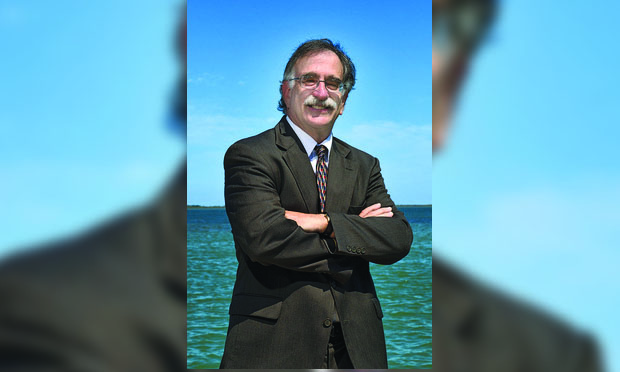Letter to the Editor: State Bar Wants to Limit Presidential Candidates to Backroom Selection Process
Imagine waking up to a phone call from incoming State Bar of Texas President Joe Longley saying “the bar just passed the 'Stop Steve Fischer Amendment.'"…
February 06, 2018 at 02:36 PM
3 minute read

Imagine waking up to a phone call from incoming State Bar of Texas President Joe Longley saying “the bar just passed the 'Stop Steve Fischer Amendment.'” I laughed and countered, “I thought it was called the 'Attorney Vote Suppression Act.'”
While the bar has improved in attempting to be more transparent and supportive, a new rule pertaining to petition signatures huge step backward. The rule limits the time period allowed for an independent SBOT presidential candidate to obtain signatures to 180 days. The State Bar Act 81.019 already has a limitation “due 30 days before the election” and the bar had no valid reason to add the time restriction. Proponents claimed they didn't like year-round campaigning. What they really wanted was to limit presidential candidates to it's closed-door, backroom selection process, or allow only wealthy candidates who could pay consultants to gather signatures. Members of the committee, including Director Andrew Tolchin, were in constant contact and I even secured a secretary of state election opinion, backing my assertion the Texas Election Code was not applicable to State Bar Elections. The bar backed off that, but added the restriction anyway.
In 2013, I was the first petition candidate under the State Bar Act, having secured 6,122 attorney signatures, mostly by standing in front of courthouses from Plainview to Beaumont and everywhere in between. Attorneys from all sections of the state should have access to the candidates, to both present their platform and listen to lawyer concerns. It took me an entire year. Since then Randy Sorrels, Lisa Blue and Joe Longley have followed suit.
If I decide to run in 2019, I will obtain signatures the same by talking to attorneys, and I dare the bar to keep me off the ballot. The board passed this knowing I might run, and did so while denying requests for a roll-call vote. If forced to sue to obtain ballot access, I would show a pattern of discrimination dating back from 2013, which included using our bar funds to extol my opponents, having me physically removed by armed guards from a CLE for which I had registered (they were concerned I might get signatures during a break), and allowing a nasty email campaign which used out-of-context statements to claim I didn't like Hispanics or Catholics, which is half of my family. Ironically, Randy Sorrels, who perpetrated the emails, is now a friend who calls once a week. He publicly apologized and has adopted my two-pronged test for bar reform (Does it help lawyers? Does it help the bar?).
The State Bar of Texas has nothing to fear with me as a candidate except that I think for myself. Unlike 2013, however, when I won an attorney general opinion after they tried to exclude me, they will be subject to even worse consequences if they try it again.
This content has been archived. It is available through our partners, LexisNexis® and Bloomberg Law.
To view this content, please continue to their sites.
Not a Lexis Subscriber?
Subscribe Now
Not a Bloomberg Law Subscriber?
Subscribe Now
NOT FOR REPRINT
© 2025 ALM Global, LLC, All Rights Reserved. Request academic re-use from www.copyright.com. All other uses, submit a request to [email protected]. For more information visit Asset & Logo Licensing.
You Might Like
View All

Putting Teenagers Behind the Wheel of Commercial Trucks Brings More Risk Than Reward


Trending Stories
Who Got The Work
J. Brugh Lower of Gibbons has entered an appearance for industrial equipment supplier Devco Corporation in a pending trademark infringement lawsuit. The suit, accusing the defendant of selling knock-off Graco products, was filed Dec. 18 in New Jersey District Court by Rivkin Radler on behalf of Graco Inc. and Graco Minnesota. The case, assigned to U.S. District Judge Zahid N. Quraishi, is 3:24-cv-11294, Graco Inc. et al v. Devco Corporation.
Who Got The Work
Rebecca Maller-Stein and Kent A. Yalowitz of Arnold & Porter Kaye Scholer have entered their appearances for Hanaco Venture Capital and its executives, Lior Prosor and David Frankel, in a pending securities lawsuit. The action, filed on Dec. 24 in New York Southern District Court by Zell, Aron & Co. on behalf of Goldeneye Advisors, accuses the defendants of negligently and fraudulently managing the plaintiff's $1 million investment. The case, assigned to U.S. District Judge Vernon S. Broderick, is 1:24-cv-09918, Goldeneye Advisors, LLC v. Hanaco Venture Capital, Ltd. et al.
Who Got The Work
Attorneys from A&O Shearman has stepped in as defense counsel for Toronto-Dominion Bank and other defendants in a pending securities class action. The suit, filed Dec. 11 in New York Southern District Court by Bleichmar Fonti & Auld, accuses the defendants of concealing the bank's 'pervasive' deficiencies in regards to its compliance with the Bank Secrecy Act and the quality of its anti-money laundering controls. The case, assigned to U.S. District Judge Arun Subramanian, is 1:24-cv-09445, Gonzalez v. The Toronto-Dominion Bank et al.
Who Got The Work
Crown Castle International, a Pennsylvania company providing shared communications infrastructure, has turned to Luke D. Wolf of Gordon Rees Scully Mansukhani to fend off a pending breach-of-contract lawsuit. The court action, filed Nov. 25 in Michigan Eastern District Court by Hooper Hathaway PC on behalf of The Town Residences LLC, accuses Crown Castle of failing to transfer approximately $30,000 in utility payments from T-Mobile in breach of a roof-top lease and assignment agreement. The case, assigned to U.S. District Judge Susan K. Declercq, is 2:24-cv-13131, The Town Residences LLC v. T-Mobile US, Inc. et al.
Who Got The Work
Wilfred P. Coronato and Daniel M. Schwartz of McCarter & English have stepped in as defense counsel to Electrolux Home Products Inc. in a pending product liability lawsuit. The court action, filed Nov. 26 in New York Eastern District Court by Poulos Lopiccolo PC and Nagel Rice LLP on behalf of David Stern, alleges that the defendant's refrigerators’ drawers and shelving repeatedly break and fall apart within months after purchase. The case, assigned to U.S. District Judge Joan M. Azrack, is 2:24-cv-08204, Stern v. Electrolux Home Products, Inc.
Featured Firms
Law Offices of Gary Martin Hays & Associates, P.C.
(470) 294-1674
Law Offices of Mark E. Salomone
(857) 444-6468
Smith & Hassler
(713) 739-1250






